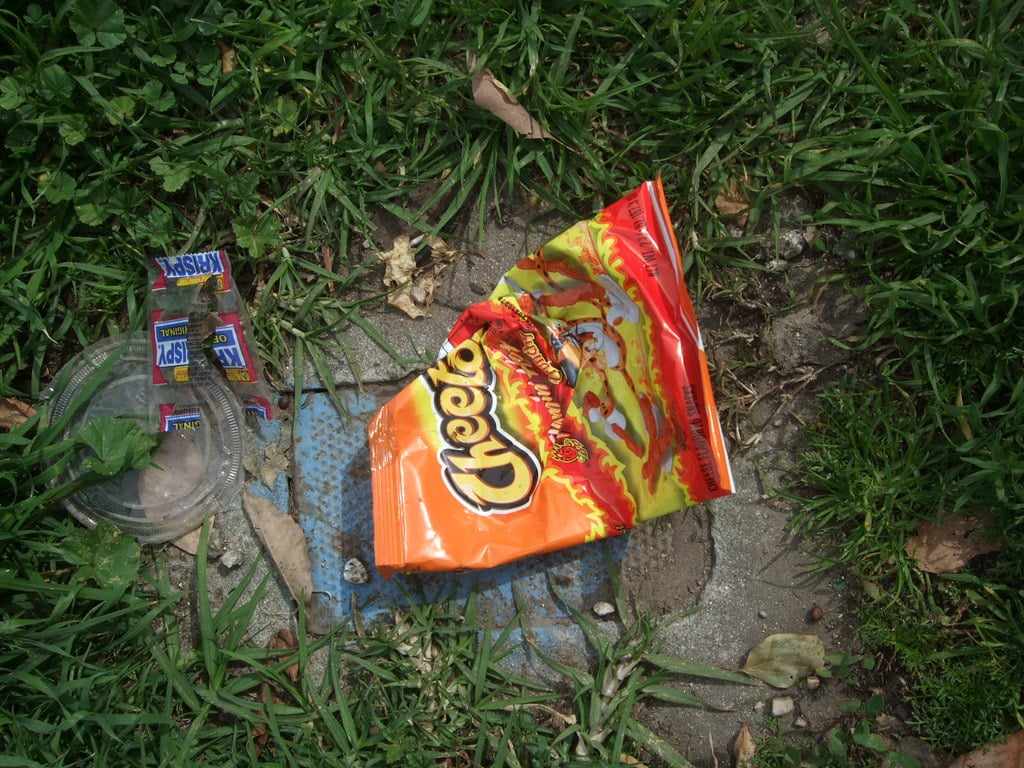Key Takeaways
- Hot Cheetos aren’t toxic to dogs but can make them quite ill
- The most common signs your dog ate hot Cheetos are drooling, panting, and vomiting
- Just a couple of Cheetos are probably not going to faze your dog though the spiciness may cause some drooling or panting
I’m always amazed at what dogs will munch on, given the chance. Luckily hot Cheetos aren’t poisonous.
While there are small amounts of garlic and onion powder in hot Cheetos these are in such small quantities they are unlikely to cause an issue. One concern aside from digestive upset is if your pooch eats a large quantity of hot Cheetos they may suffer from pancreatitis due to the high calorie and fat content.
As a cornmeal snack, it can be quite difficult for dogs to digest and can cause vomiting, diarrhea, and abdominal pain. Read on to find out more about hot Cheetos and what happens to naughty pups who try them out.
How many hot Cheetos are toxic to dogs?
As mentioned above, hot Cheetos aren’t toxic to dogs per se but can cause tummy upsets in significant quantities.
If your fur baby ate just a couple that dropped to the floor or your child fed them one or two, then there’s likely no need for any concern.
If, however, your 20lb pooch managed to munch through an entire bag before deciding they’re a little too spicy, you can probably expect some degree of drooling or vomiting.
Hot Cheetos aren’t toxic, but if eaten in large enough quantities can cause tummy upsets.
What to do if my dog ate hot Cheetos?
The first thing is not to panic! Some dogs appear to have cast iron stomachs and can simply go about their day after eating some hot Cheetos without any adverse effects.
However, once you know they’ve eaten some, it can be concerning, and the first thing to do is monitor your dog for signs of pain, discomfort, or tummy upset.
If you’ve eaten hot Cheetos, then you know they can be quite spicy and hot. The most common sign you can expect in your pooch after eating some (even just one or two, depending on how small your pup is) is drooling or sometimes panting.
If you notice this, then offer them some water or ice cubes to crunch on, which will help to soothe the burning. Don’t feed your dog milk as lactose in milk is hard to digest and can exacerbate the issue.
Hot Cheetos are quite spicy, and you can offer your dog some water if they start to drool after eating them. Monitoring your dog is key after they’ve eaten hot Cheetos to catch signs of a digestive upset early.
When to see a vet?
Most dogs don’t need to see a vet if they’ve eaten just a few hot Cheetos. Simply monitor them, and if they start to vomit, you can withhold food for a few hours and then offer a bland diet such as boiled, skinless chicken and boiled rice with no additives for a few days until their tummy has had a chance to recover.
If drooling or vomiting persists beyond a few times after eating hot Cheetos, then you should contact your veterinarian, as your dog may need some medications to help settle their stomach. Another indication your dog may need to see a vet is if they’ve developed bloating or persistent abdominal pain.
Your dog is unlikely to need to see a vet unless they’ve eaten a large quantity of Cheetos and their signs of vomiting, abdominal pain or drooling persist. If your dog has a history of pancreatitis, then you should contact your veterinarian after you notice they’ve eaten a lot of hot Cheetos as we want to prevent another bout of this painful condition.
What if my dog ate plenty of hot Cheetos but seems fine?
Most fur babies are fine after eating just one or two hot Cheetos though they may feel a little tingling in their mouth from the ‘hotness.’ You can offer some water to help ease their discomfort but don’t be surprised if they refuse.
Some pups may rub at their face with their paws if they have mouth pain from the heat, but this will pass soon.
If your pooch has started to vomit, then simply allow it to pass; it’s most likely that they will just vomit a few times. Do prevent your pooch from licking at their vomit, as this can simply prolong the length of time they’re ill. Withhold food for a few hours before offering a small amount of a bland diet for a day or two until their stomach has settled back to normal.
Persistent vomitings or abdominal pain, such as a hunched appearance or abdominal swelling, are not normal, and at that point, your dog should be examined by your veterinarian.
Short-term vomiting, small amounts of diarrhea, and signs of oral pain are common and shouldn’t need much more than supportive care at home. I don’t recommend inducing vomiting unless a very large quantity of hot Cheetos were eaten by dogs that have a history of pancreatitis, as this can exacerbate the inflammation your dog is suffering.
Signs that my dog ate hot cheetos
Signs that your pooch ate your hot Cheeto snack include:
- Vomiting
- Diarrhea
- Oral discomfort
- Drooling
- Panting
- Abdominal pain
- Bloating/abdominal swelling
What happens to dogs that eat hot Cheetos?
Fur babies that munch on hot Cheetos generally pay for their indiscretion with oral pain and inflammation, and sometimes vomiting. If your dog ate a large quantity of hot Cheetos then they may also experience abdominal pain and diarrhea.
Oral inflammation and mild vomiting are the most likely things that your dog will experience if they’ve eaten hot Cheetos.
How do vets treat dogs that ate hot Cheetos?
If your dog has persistent signs and you’ve needed to take them to the vet, then there are a few things your vet will do. In order to treat the persistent vomiting, your veterinarian will administer medications to stop your dog from feeling nauseated and reduce further vomiting.
Your vet may also prescribe gastro-protectant medications to coat the lining or reduce the production of stomach acid, which will help reduce inflammation and, thus, the pain your pooch is feeling.
dogs with abdominal pain or that have persistent vomiting or diarrhea may need stronger pain medications and even IV fluids if they have become dehydrated. These are rare cases, though, and most dogs won’t need hospitalization.
Your veterinarian will provide further supportive care to your pooch if they need to be examined and will administer anti-nausea medications, pain relief, and gastro-protectant medications. These will help your dog feel better and get them back to their naughty selves quickly.
Final Woof
Pooches get themselves into the silliest things, even hot Cheetos given the chance (we’re looking at you, labradors).
If your dog has eaten hot Cheetos, you can rest easy that they’re not toxic nor poisonous. Most dogs will feel no ill effects (aside from some minor oral inflammation and heat), but if they do suffer some vomiting, it will likely pass without incident or need for veterinary attention.
dogs that suffer from prolonged vomiting or profuse diarrhea should be seen by your veterinarian, or if your dog has a history of pancreatitis, then they should also be examined to prevent another bout.


